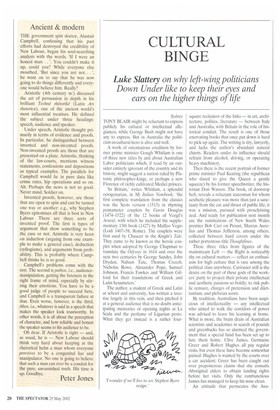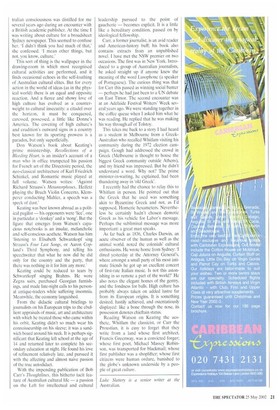CULTURAL BINGE
Luke Slattery on why left-wing politicians
Down Under like to keep their eyes and ears on the higher things of life
Sydney TONY BLAIR might be reluctant to express publicly his cultural or intellectual allegiances, while George Bush might not have any to express. But in Australia the politician-as-cultural-hero is alive and well.
A work of ostentatious erudition by former prime minister Gough Whitlam is one of three new titles by and about Australian Labor politicians which, if read by an outsider entirely ignorant of the country and its history, might suggest a nation ruled by Platonic philosopher-kings, or perhaps a new Florence of richly cultivated Medici princes.
'In Britain,' writes Whitlam, a splendid octogenarian, in My Italian Notebook, 'the first complete translation from the classics was the Scots version (1513) in rhyming pentameter couplets by Gavin Douglas (1474-1522) of the 12 books of Vergil's Aeneid, with which he included the supplementary 13th book (1427) by Maffeo Vegio (Lodi 1407-58, Rome). The couplets were first used by Chaucer in the Knight's Tale. They came to be known as the heroic couplet when adopted by George Chapman to translate the Odyssey in 1614 and over the next two centuries by George Sandys, John Dryden, Nahum Tate, Thomas Creech, Nicholas Rowe, Alexander Pope, Samuel Johnson, Francis Fawkes and William Gifford for their translations of Greek and Latin hexameters.'
The author, a student of Greek and Latin at school and university, has written a treatise largely in this vein, and then pitched it at a general audience that is no doubt anticipating memories of opening nights at La Scala and the perfume of Ligurian pesto. What they get instead is a rather four square recitation of the links — in art, architecture, politics, literature — between Italy and Australia, with Britain in the role of historical conduit. The result is one of those enervating books that once put down is hard to pick up again. The writing is dry, lawyerly, and lacks the author's abundant natural charm. Readers under its influence should refrain from alcohol, driving, or operating heavy machinery.
Then there is the recent portrait of former prime minister Paul Keating (the republican who dared to give the Queen a gentle squeeze) by his former speechwriter, the historian Don Watson. The book, of doorstop heft, reveals a reluctant statesman for whom aesthetic pleasure was more than just a sanctuary from the cut and thrust of public life; it was a mission, pursued with proselytising zeal. And ready for publication next month are the ruminations of New South Wales premier Bob Carr on Proust, Marcus Aurelius and Thomas Jefferson, among others, collected between hard covers under the rather portentous title Thoughtlines.
These three titles from figures of the mainstream Left — the Right is noticeably shy on cultural matters — reflect an enthusiasm for high culture that is rare among the political class anywhere. Curiouser still is the desire on the part of these gods of the workers' party to project their private intellectual and aesthetic passions so boldly; to risk public censure, charges of pretension and dilettantism, and plebeian scorn.
By tradition, Australians have been suspicious of intellectuality — any intellectual who aimed to walk the corridors of power was advised to leave his learning at home. What is more, the brain drain of Australian scientists and academics in search of pounds and greenbacks has so alarmed the government that a special fund has been set up to lure them home. Clive James, Germaine Greer and Robert Hughes all pay regular visits, but even these have become somewhat pained: Hughes is wanted by the courts over a car accident: Greer has been caught out over preposterous claims that she consults Aboriginal elders to obtain landing rights before her visits. Only the rambunctious James has managed to keep his nose clean.
An attitude that permeates the Aus
tralian consciousness was distilled for me several years ago during an encounter with a British academic publisher. At the time I was writing about culture for a broadsheet Sydney newspaper. This seemed to confuse her. 'I didn't think you had much of that,' she confessed. 'I mean other things, but not, you know, culture.'
This sort of thing is the wallpaper in the drawing-room in which most recognised cultural activities are performed, and it finds occasional echoes in the self-loathing of Australian cultural elites. But for every action in the world of ideas (as in the phys ical world) there is an equal and opposite reaction. And a fierce and showy love of high culture has evolved as a counter weight to cultural insecurity: a citadel over the horizon, it must be conquered, caressed, possessed, a little like Donne's America. The coveting of high culture's and erudition's outward signs in a country best known for its sporting prowess is a paradox, but only superficially.
Don Watson's book about Keating's prime ministership, Recollections of a Bleeding Heart, is an insider's account of a man who in office trumpeted his passion for French art of the Directoire period, the neo-classical architecture of Karl Friedrich Schinkel, and Romantic music played at full volume. Watson writes: 'Against Richard Strauss's Metamorphoses. Heifetz playing the Bruch Violin Concerto, Klemperer conducting Mahler, a speech was a speck of dust.'
Keating was best known abroad as a political pugilist — his opponents were 'lice', one
in particular a 'donkey' and a 'nong.. But the
figure that emerges from Watson's capacious notebooks is an insular, melancholic and self-conscious aesthete. Watson has him 'listening to Elisabeth Schwarzkopf sing Strauss's Four Last Songs, or Aaron Cop land's Third Symphony, and telling his speechwriter that what he now did he did only for the country and the party, that there was nothing in it for him any more.'
Keating could be reduced to tears by Schwarzkopf singing Brahms. He wore Zegna suits, purchased Georgian furnishings, and made late-night calls to his personal antique-traders while suffering insomnia. Meanwhile, the economy languished.
From the didactic cultural briefings to journalists on his European trips to the ebul
lient appraisals of music, art and architecture with which he treated those who came within his orbit, Keating didn't so much wear his connoisseurship on his sleeve; it was a sand wich board around his neck. It is perhaps significant that Keating left school at the age of 14 and returned later to complete his secondary education at night. He found his love of refinement relatively late, and pursued it with the affecting and almost naive passion of the true autodidact.
With the impending publication of Bob Carr's Thoughtlines, this hitherto tacit fea ture of Australian cultural life — a passion on the Left for intellectual and cultural leadership pursued to the point of gaucherie — becomes explicit. It is a little like a hereditary condition, passed on by ideological fellowship.
Carr, a former journalist, is an avid reader and American-history buff; his book also contains extracts from an unpublished novel. I have met the NSW premier on two occasions. The first was in New York. Introduced to a group of Australian journalists, he asked straight up if anyone knew the meaning of the word Lusophone (a speaker of Portuguese). The curious thing was that for Carr this passed as winning social banter — perhaps he had just been to a UN debate on East Timor. The second encounter was at an Adelaide Festival Writers' Week several years ago. We were standing together in the coffee queue when I asked him what he was reading. He replied that he was making his way through all of Tolstoy.
This takes me back to a story I had heard as a student in Melbourne from a GreekAustralian who recalled Whitlam visiting his community during the 1972 election campaign. Gough had addressed the crowd in Greek (Melbourne is thought to house the biggest Greek community outside Athens), and my friend was impressed. But he didn't understand a word. Why not? The prime minister-in-waiting, he explained, had been thundering away in 'old Greek'.
I recently had the chance to relay this to Whitlam in person. He pointed out that the Greek that he used was something akin to Byzantine Greek and not, as I'd supposed, Homeric hexameters. Nevertheless he certainly hadn't chosen demotic Greek as his vehicle for Labor's message. Perhaps the subliminal message was more important: a great man speaks.
As far back as 1836. Charles Darwin, an acute observer of the human as well as the animal world. noted the colonials' cultural enthusiasms. He wrote home from Sydney: 'I dined yesterday at the Attorney General's, where amongst a small party of his most intimate friends he got up an excellent concert of first-rate Italian music. Is not this astonishing in so remote a part of the world?' He also notes the elegant homes of the gentry, and the fondness for balls. High culture has probably always taken on added lustre far from its European origins. It is something desired, hastily achieved, and ostentatiously displayed: like a bone through the nose, its possession denotes chieftain status.
Reading Watson on Keating the aesthete, Whitlam the classicist, or Carr the Proustian, it is easy to forget that they write from a land whose first architect. Francis Greenway, was a convicted forger; whose first poet, Michael Massey Robinson, was transported for blackmail: whose first publisher was a shoplifter; whose first citizens were human ordure, banished to the globe's unknown underside by a people of great culture.
Luke Slattely is a senior writer at the Australian,























































































 Previous page
Previous page